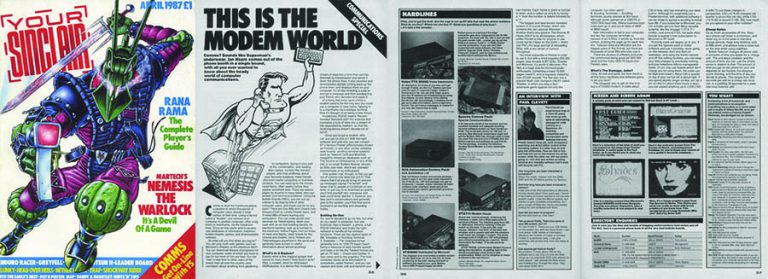My earliest exposure to the internet (not the world wide web) was through the 1983 film WarGames. This film has steadfastly become my favourite film over the years, mainly due to the sheer excitement it caused me when I first watched the character of David Lightman dial into his school’s computer and change his grades. I was used to playing Manic Miner on my ZX Spectrum. I had absolutely no idea that computers could be used for hacking into other systems like that. The concept was mind-blowing.
In WarGames, David Lightman ‘hacks’ into his school’s computer just by using a simple password that was written down in the school office. Pretty quaint security. Nowadays things like phishing and hacking are big business, and so is internet security. Everyday users are now using personal VPNs, for security, and also for things like gaming; see more. It really just goes to show how far the internet has come in general since the early 80s.
I remember shortly after I watched WarGames for the first time, I read the April 87 issue of Your Sinclair which had a big feature about modems. This really brought home the reality that the stuff that Matthew Broderick was doing in the film might actually be possible in my own home. The article reviewed different modems and also opened my eyes to things like Bulletin Boards, Usenet and MUD Dungeons. I never actually got to get a modem until the more mainstream world wide web hit a few years later, but even just reading and re-reading that Your Sinclair article was hugely exciting to me.

The early mainstream world wide web, in the mid to late 90s, is something that people almost look back on in a comical way, because it’s just such a far cry from where we are today.
- Dialup modems and the noise they make
- Your family not being able to use the phone when you were on the internet
- Endless magazine cover CDs with access to ISPs and services like AOL, Compuserve, Pipex, Demon and Freeserve
- Early browsers, search engines and mail clients such as Netscape Navigator, Pegasus, Gopher, AltaVista and Ask Jeeves
- Building your own websites using raw HTML with frames, using GIFs, hit counters and Under Construction banners
I never became a hacker myself but one of the closest experiences I had was one day in 1998 when I was browsing the website of the football team I support, Glasgow Rangers. Their website was pretty basic at the time and, as I knew the basics of how websites were built, I thought I would play around with the url in the web browser. On a complete hunch I wrote ‘/newsite/’ at the end of the main url and, lo and behold, I suddenly was looking at a new shiny much improved Rangers website in the making. It was like my own David Lightman moment where he finds the secret password and thinks he has hacked into Protovision. The Rangers website obviously had no security and I was freely able to just nosey around the new site while it was being built. For someone like me that was constantly trying to improve my web design skills it was a fascinating experience. I ended up contacting their ‘webmaster’ and explaining what had happened and pointed out a few spelling mistakes on the new under-wraps site. They actually quite appreciated my help and I kind of became an informal proof-reader for them.
Security started to become a bit more of an issue when everybody started using Napster and Limewire. That was such an exciting time, in the early 2000s, when everyone really began to understand the power of the internet. Broadband started to become mainstream and people could stay online permanently and download hours and hours of ‘free’ music.
Around this time in the early 2000s I remember watching an episode of 24, where Mike Novick flips open his flip phone and watches a news clip on his phone, in seemingly high speed, high resolution streaming video. I distinctly remember thinking that this looked very fake. We were just about at the time where you could watch video on some brand new phones. But for most people we had to stick with WAP websites (remember them?). If you did have the availability of watching video on your phone you would have slowly navigate to the website and then click on the video, and then probably download a RealPlayer plugin and then watch a slow stuttery low res video. I remember wondering if we would ever quite to the quality shown in that episode of 24. It seemed like something out of Dick Tracy or something. Little did I know that only 2 or 3 years later, something called YouTube would be launched, and also the quality of phones increase with the launch of the iPhone, and 3G and 4G would become mainstream.

Obviously one of the biggest advancements or uses of the internet in the last 5 years or so is the advent of streaming video. YouTube is just a behemoth and many kids are watching it instead of TV. But even adults are now moving from network TV to streaming services like Netflix, Amazon Prime and Disney+. This would not be possible without the ongoing improvements in internet technologies.
And the other area that was absolutely revolutionised the use of the internet, as well as drastically changing our lives, is the improvement in mobile phones and their access to the internet. For better or worse, they have become almost a cyborg attachment to our persons. An extension of ourselves which tethers us to news, entertainment, friends.
As mentioned earlier, internet security is big business these days, with VPNs and other services being almost a requirement to survive. We have cookies tracking our every move, and our accounts and online presences are linked through all our devices, and even our Alexas are always listening to us and suggesting products we might like. We are truly part of an online hive, all driven by the internet.
I used to think that the gap between my generation and our parents was huge, with things like indoor toilets, improvements in electricity, credit cards, computers and video games all appearing, or becoming mainstream, in their lifetimes. But actually I often think that my children’s generation will find it even more strange to think what a life without mobile phones or the internet was like. The pre-internet world must seem so ancient to children that were born in it.

